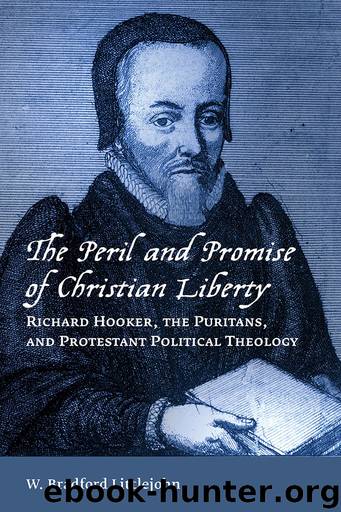The Peril and Promise of Christian Liberty by Littlejohn W. Bradford;

Author:Littlejohn, W. Bradford;
Language: eng
Format: epub
Publisher: William B. Eerdmans Publishing Company
1. As André Gazal has shown in ch. 8 of his Scripture and Royal Supremacy in Tudor England: The Use of Old Testament Historical Narrative (Lewiston, NY: Edwin Mellen, 2013), the standard conformist defense of royal supremacy during this period was divine right, resting on the same hermeneutic that the precisianists then deployed in favor of a divine-right presbyterianism.
2. SR 56.22.
3. M. E. C. Perrott, “Richard Hooker and the Problem of Authority in the Elizabethan Church,” Journal of Ecclesiastical History 49, no. 1 (1998): 43–44. See also Peter Lake, Anglicans and Puritans? Presbyterianism and English Conformist Thought from Whitgift to Hooker (London: Unwin Hyman, 1988), 39, and 119, 125, where Lake shows the same problem at work in later conformists such as John Bridges.
4. Of course, it would be unfair to exaggerate this tendency. After all, the conformists did not simply resort to bald coercion. On the contrary, they wrote lengthy tracts and treatises arguing against Puritanism and calling for conformity, and the very act of writing is an attempt to rationally persuade an intelligent reader. Nonetheless, as Lake has argued, they drew upon a rather thin arsenal of arguments for the purpose, and were quick to flee to the skirts of the magistrate for protection when they had run out of weapons (Lake, Anglicans and Puritans? 119).
5. It is worth noting how both sides in this dispute sought to defend the liberty of “the church”; where Puritans saw their opponents as enslaving the church to the state, conformists saw their opponents enslaving both church and state to a legalistic construal of Scripture. We often tend to view the controversy through Puritan eyes, as one between church and state, and might thus expect Hooker to set the question of the royal supremacy and the relative powers of civil and ecclesiastical authorities front-and-center in his argument. And yet it is in but one, and the last, of the “particular decisions” that Hooker undertakes to discuss, and plays no role in the “general meditations” of Books I–IV. The fundamental problem, for Hooker, is correctly characterizing the relationship between the two realms, coram Deo and coram hominibus; once he has shown that both civil and ecclesiastical polity belong in the latter, their specific administration is a comparatively secondary matter.
6. SR, Appendix, i.21–22. See n. 13 in Chapter Three above.
7. WW I:264–67, II:90; Cartwright, SR 440.
8. In V.10.1 he asks, “[If] the Church did give every man license to follow what himself imagineth that God’s Spirit doth reveal unto him, or what he supposeth that God is likely to have revealed to some special person whose virtues deserve to be highly esteemed, what other effect could hereupon ensue, but the utter confusion of his Church under pretense of being taught, led, and guided by his spirit[?]” (FLE 2:46.22–28).
9. Robert Eccleshall, “Richard Hooker’s Synthesis and the Problem of Allegiance,” Journal of the History of Ideas 37, no. 1 (1976): 114.
10. Eccleshall, “Richard Hooker’s Synthesis,” 114. Cf. “We therefore crave . . . to have it
Download
This site does not store any files on its server. We only index and link to content provided by other sites. Please contact the content providers to delete copyright contents if any and email us, we'll remove relevant links or contents immediately.
Signature in the Cell: DNA and the Evidence for Intelligent Design by Stephen C. Meyer(2877)
Real Sex by Lauren F. Winner(2863)
The Holy Spirit by Billy Graham(2775)
The Secret Power of Speaking God's Word by Joyce Meyer(2751)
The Gnostic Gospels by Pagels Elaine(2396)
Jesus by Paul Johnson(2226)
Devil, The by Almond Philip C(2204)
23:27 by H. L. Roberts(2142)
The Nativity by Geza Vermes(2113)
Chosen by God by R. C. Sproul(2053)
All Things New by John Eldredge(2051)
Angels of God: The Bible, the Church and the Heavenly Hosts by Mike Aquilina(1867)
Angels by Billy Graham(1843)
The Return of the Gods by Erich von Daniken(1839)
Knowing God by J.I. Packer(1723)
Jesus of Nazareth by Joseph Ratzinger(1706)
Evidence of the Afterlife by Jeffrey Long(1704)
The Gnostic Gospel of St. Thomas by Tau Malachi(1677)
How To Be Born Again by Billy Graham(1668)
